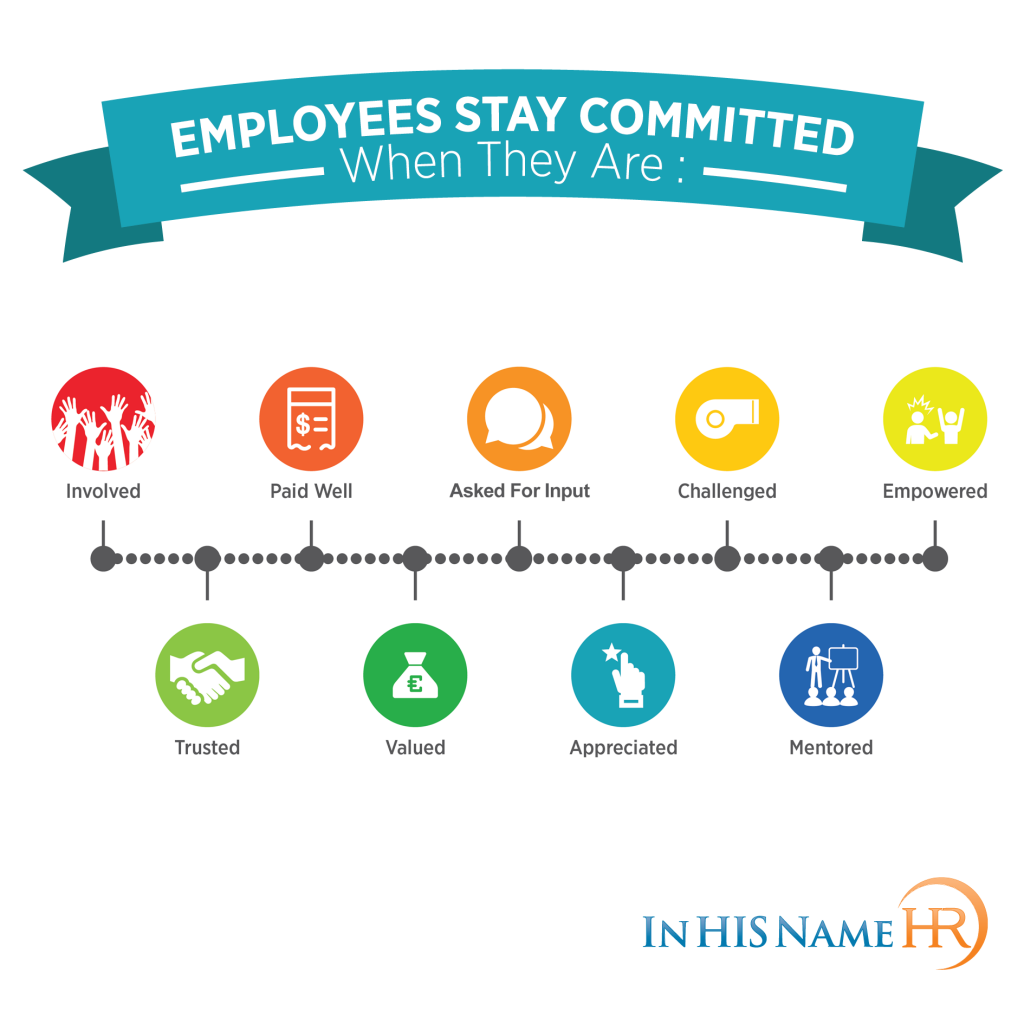Are Your Employees Truly Empowered? Employee Commitment Series

This blog series focuses on nine areas that keep employees committed to your organization. In our opinion, employees stay committed when they are Involved, Paid Well, Asked for Input, Challenged, Empowered, Trusted, Valued, Appreciated, and Mentored.
Are Your Employees Truly Empowered?
An organization’s most powerful asset is its workforce, and many leaders lose sight of that. While the metrics may center on the finances, enrollment numbers, on-time delivery, user statistics and customer feedback, ultimately it’s the frontline employees who are giving their all to keep the organization strong. Our experience is that no matter the product or services offered, many organizations miss the mark when it comes to how to empower employees.
To that end, being sure to empower your employees will go a long way toward both increasing productivity and lowering attrition rates, not to mention ensuring strong interaction between employees and the people you serve.
From a Christian perspective, it behooves us to empower everyone we can, and doing God’s work is just as vital at work as it is at church, at home, and everywhere we interact with others.
From a leadership perspective, we trust our employees to represent the organization in the best possible way—but this can be faulty logic if employees do not feel as though their contribution is vital to the health of the organization.
Failing to make employees feel needed and empowered can lead to resentment, poor performance and high staff turnover. It can wield a real impact on the success of your organization in several ways.
For example, a 2017 Gallup poll showed 85% of employees are not engaged or actively disengaged at work. —disengaged workers have been found to cause corporate losses of between $450 and $500 billion per year.
Recent studies have also shown that promoting employee happiness leads to an increase in engagement, which ultimately encourages employees to take ownership in the success of the organization.
How can you empower your employees? Here’s our list of ways to ensure they feel empowered:
Define a clear path to success
True leadership means promoting a clear vision of organizational success and enabling your team to take ownership in order to reach that success.
By helping to define the organization’s vision, along with defining the roles people need to fill in order to contribute to the overall success of the organization, you succeed in giving your staff the clarity they need to move the business ahead.
Trust is vital
One of the most critical steps you can take to help your employees feel empowered is to demonstrate that you trust their expertise and have faith in their decisions.
By allowing your employees to use their knowledge to brainstorm and implement viable processes and solutions, you demonstrate your belief that their contribution is directly responsible for the success of your venture.
While many organizations take the attitude that developing process is something only management can do, your frontline staff can almost always provide you valuable input, so treat their knowledge as an asset.
Communicate
By communicating clearly and ensuring that employees always know exactly where they stand, you open the door for a balanced, happy workforce.
From day-to-day expectations to organizational-wide policies, and everything in between, making sure that your communication is both heard and understood leaves little room for misunderstanding, and helps employees to feel as though they are important enough to be in the know.
Engage
No matter how much work you put into making your employees feel empowered, little will come of it if you stride by the proverbial water cooler each day and don’t bother to interact.
Team building is a vital component in engaged, cohesive teams, and that means not only helping your staff engage with each other but participating in the interaction. Great leadership starts with a true understanding of the organization from the ground level up. Taking the time to connect with employees is a vital means to achieve that.
Offer opportunities to learn
Knowledge is empowerment, and by allowing your employees the chance to engage in self-directed learning, you offer true empowerment that can last a lifetime.
Whether through self-directed learning or by establishing other means such as an organization-wide education platform, allowing your employees the opportunity to learn about job-related subjects not only improves work performance but allows them to feel stronger in their area of expertise. Consider building learning into your annual review process. Have a section where employees can identify their strengths and build on those. Oftentimes, review systems zero in on the negative. In contrast, our process focuses on the positives while mitigating and eliminating the deficiencies, or what some call negatives. Learn more about how we partner with organizations here.
Offering learning opportunities also illustrates to your staff that you view their expertise as a worthwhile investment, which creates a lasting bond with the organization.
Overall, empowering employees helps plant the seeds for long-term organizational growth and success, while building strong, highly engaged teams. Offering your staff this type of support will go a long way toward helping them feel invested in the success of the organization while ensuring healthy customer and client relations.
From improved productivity to employee engagement, empowerment of this kind is an investment in your greatest asset—your workforce.
It’s also always the right thing to do, as both a leader and a Christian.
______
In His Name HR helps organizations build high-performance Human Resources programs. Visit them at In HIS Name HR.
Mark A. Griffin is the founder and chief consultant of In His Name HR LLC. Connect with him on LinkedIn or Twitter.

Receive Blog Updates
|
|
Thank you for Signing Up |




